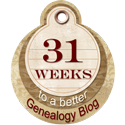Getting Serious Class-Probate Records
Pop Question - Can you explain what the term "orphan" referred to?
My class yesterday was another real eye opener! Any of our ancestors affiliations with the government would have taken place at the county courthouse. So, the coverage of the class involved county courthouse records, primarily probate records.
Our fabulous instructor covered the who, why, and wherefore's of probate. The purposes of probate, the probate process and the many records that could be available for us to research. Again, I was impressed and amazed at the records involved.
Here are some records possibly available when a probate is involved:
Petition to Administer the Estate
Hearing on the Petition
Bonds posted by the Executor
Letters Testamentary
Letters of Administration
Inventory of property
Creditor's claims
Interim accounts
Sales of property
Determination of widows rights
Guardians for minors
Bond changes
Resignations
Revocations
Final settlement
What a lot of information there is to be found in probate records! Most information will be found in courthouses, but you may find notices printed in newspapers also. Information on siblings, the living spouse (if there is one) , along with possible occupation and social status are just a tidbit of info you may find. Locating and viewing the inventory of property can really give you a sense of the social status of the deceased.
Key points from the class~
1. If you know your ancestor owned property, but can't locate a probate file, check the land records. A large amount of land was transferred to heirs prior to death, therefore bypassing probate.
2. Probate didn't always take place immediately after death. You may have to check a large range of years.
3. Knowledge of inheritance laws of the area and time period is necessary for a complete understanding of probate records.
The list of actual records to search total over 50, I never would have realized the abundance of records probate could entail.
I have not had the opportunity as of yet to research probate files, but I have the information now to know what to search for, where to search and what I may find.
Answer to pop question - "Orphan" usually referred to a minor whose father was deceased. The mother may still be living!
Thanks for stopping by!
May you have success in all of your genealogical treasure hunts!
Msteri
My class yesterday was another real eye opener! Any of our ancestors affiliations with the government would have taken place at the county courthouse. So, the coverage of the class involved county courthouse records, primarily probate records.
Our fabulous instructor covered the who, why, and wherefore's of probate. The purposes of probate, the probate process and the many records that could be available for us to research. Again, I was impressed and amazed at the records involved.
Here are some records possibly available when a probate is involved:
Petition to Administer the Estate
Bonds posted by the Executor
Letters Testamentary
Letters of Administration
Inventory of property
Creditor's claims
Interim accounts
Sales of property
Determination of widows rights
Guardians for minors
Bond changes
Resignations
Revocations
Final settlement
What a lot of information there is to be found in probate records! Most information will be found in courthouses, but you may find notices printed in newspapers also. Information on siblings, the living spouse (if there is one) , along with possible occupation and social status are just a tidbit of info you may find. Locating and viewing the inventory of property can really give you a sense of the social status of the deceased.
Key points from the class~
1. If you know your ancestor owned property, but can't locate a probate file, check the land records. A large amount of land was transferred to heirs prior to death, therefore bypassing probate.
2. Probate didn't always take place immediately after death. You may have to check a large range of years.
3. Knowledge of inheritance laws of the area and time period is necessary for a complete understanding of probate records.
The list of actual records to search total over 50, I never would have realized the abundance of records probate could entail.
I have not had the opportunity as of yet to research probate files, but I have the information now to know what to search for, where to search and what I may find.
Answer to pop question - "Orphan" usually referred to a minor whose father was deceased. The mother may still be living!
Thanks for stopping by!
May you have success in all of your genealogical treasure hunts!
Msteri


Greetings Mysteri,
ReplyDeleteYour classes sound very informative and interesting. I am taking genealogy classes on-line, however, in-class classes are usually so much better. Thank-you for sharing what you are learning.
Greetings to you Kathryn,
ReplyDeleteI have taken several online classes also, they have been great fun and I have learned a lot from them. This course is different in that it is teaching me to do everything I haven't been doing as a whole. The class covers genealogy in general, but most importantly it is helping me through some of the mainstays of the field. Hope you are enjoying your class, I love them all!
Msteri
I had no idea these classes got into such detail on legal matters. Very impressive work, and I'm sure other genealogists appreciate the sharing...
ReplyDeleteHi Keeg's mom!
ReplyDeletePeople in general tend to think genealogy is just finding who your mother's mother was, when and where they were born and when they died, etc. Many genealogists however however delve and collect family histories of these people also, therefore there is so much more involved. These people aren't only genealogists, they are Family Historians too! I am the family historian collector of the family! :-)
Thanks for stopping by!
Msteri